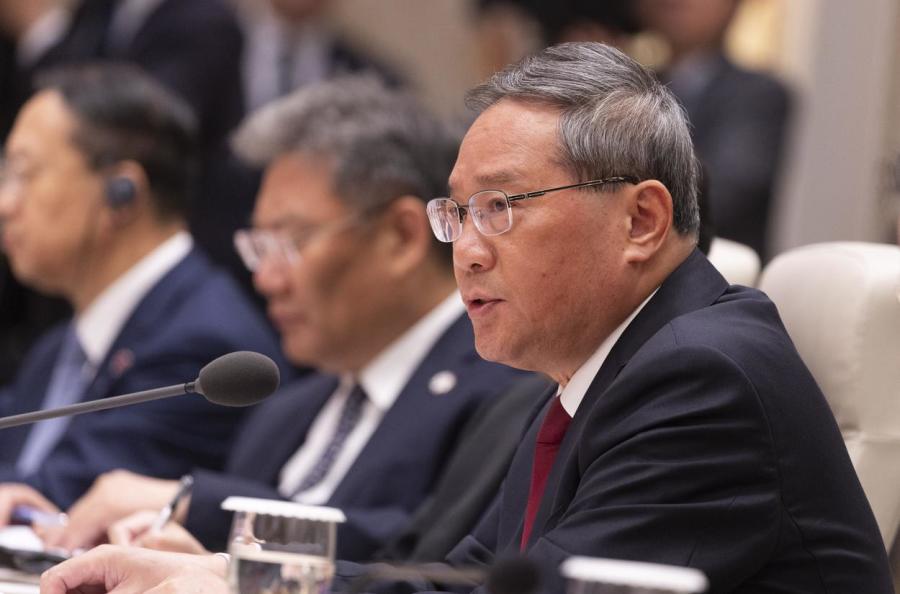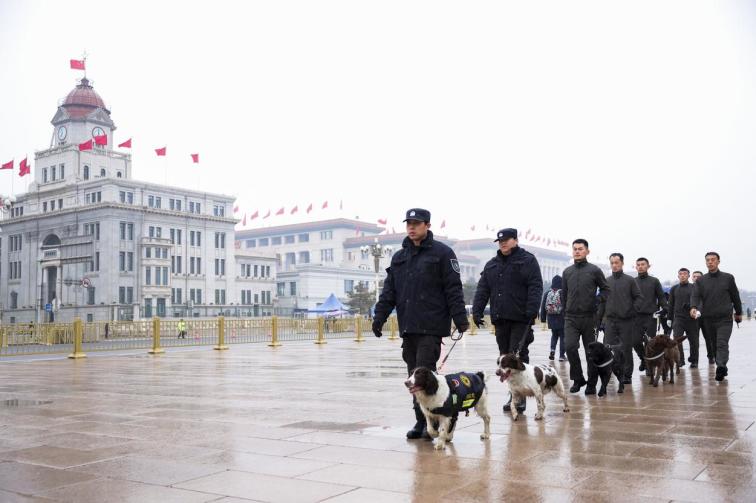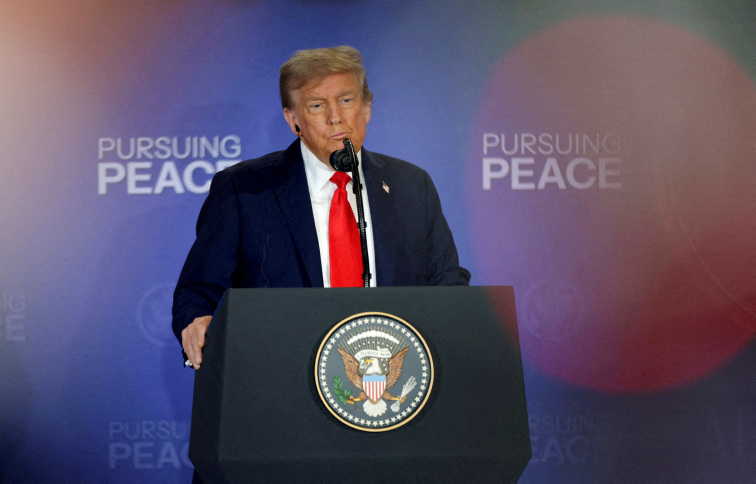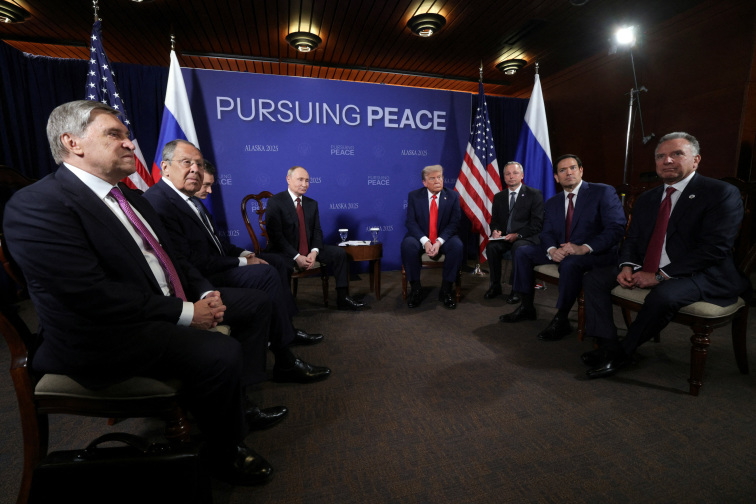The image shows Chinese Premier Li Qiang. (Jeon Heon-kyun - Pool/Getty Images)
[People News] On August 15, Li Qiang, a member of the Standing Committee of the Political Bureau of the Communist Party of China and Premier, attended the opening ceremony of the 2025 National Ecological Day main event and a seminar in Beijing focused on the concept that 'lucid waters and lush mountains are invaluable assets.' His appearance as the second-highest official in the CCP signifies the conclusion of the closed-door Beidaihe meeting that took place in early August. There have been various overseas reports regarding the content of the Beidaihe meeting and whether a timeline for Xi's departure was established, but none have been confirmed, so we can only wait for further developments.
However, Li Qiang's remarks at the seminar he just attended provide some clues.
In June 2023, the National People's Congress of the CCP passed a decision to designate August 15 as National Ecological Day. The inaugural main event for National Ecological Day was held in Huzhou, Zhejiang Province, organised by the National Development and Reform Commission in collaboration with the Central Propaganda Department, the Ministry of Natural Resources, the Ministry of Ecology and Environment, and the Zhejiang Provincial Government. The main event for National Ecological Day in 2025 is scheduled to take place in Sanming, Fujian Province, while this year's event was held in Beijing.
Over the past three years of main events for National Ecological Day, keynote speeches have been delivered by Ding Xuexiang, a member of the Standing Committee and First Vice Premier in 2023, Vice Premier Liu Guozhong in 2024, and this year's Premier Li Qiang. The choice to hold this year's event in Beijing, with Li Qiang in attendance, may be significant as it marks the 20th anniversary of Xi's proposal of the concept 'lucid waters and lush mountains are invaluable assets.'
During the first national ecological day event of 2023, Xi Jinping provided guidance, highlighting that 'the construction of ecological civilisation is a fundamental strategy for the sustainable development of the Chinese nation, a significant political issue concerning the party's mission and purpose, and a crucial social issue related to the well-being of the people.' He expressed hope that 'the entire society will take action.' Ding Xuexiang, who attended the opening ceremony, conveyed Xi's instructions and delivered a speech.
In his address, Ding Xuexiang remarked that 'since the 18th National Congress of the Communist Party, the Party Central Committee, led by Xi Jinping, has prioritized the construction of ecological civilization as a fundamental strategy for the sustainable development of the Chinese nation, undertaking a series of groundbreaking initiatives with unprecedented determination, intensity, and effectiveness...' He called for 'in-depth study and implementation of Xi Jinping's thoughts on ecological civilisation' and for 'further deepening the popularisation of Xi Jinping's ecological civilisation thoughts.'
In the 2024 event, Xi did not issue any instructions. Liu Guozhong stated in his speech that 'since the 18th National Congress of the Communist Party, the Party Central Committee, with Xi Jinping at its core, has integrated the construction of ecological civilisation into the overall framework of the 'five-in-one' strategy, firmly establishing and practising the principle that clear waters and lush mountains are invaluable assets... The construction of ecological civilisation in the new era has experienced historic, transformative, and comprehensive changes.' He also noted that 'the 20th Central Committee's Third Plenary Session made significant plans for deepening the reform of the ecological civilisation system' and emphasised 'the need to deeply study and implement Xi Jinping's thoughts on ecological civilisation,' among other points.
Liu Guozhong highlighted that as the second National Ecological Day approaches, Xi Jinping responded to environmental volunteers in the Danjiangkou Reservoir area of Shiyan, Hubei, expressing his strong hopes for building a beautiful China characterised by enduring green mountains, flowing waters, and fresh air. He stressed the importance of 'seriously studying and implementing the spirit of Xi Jinping's important reply.'
This year marks the 20th anniversary of Xi's assertion that 'lucid waters and lush mountains are invaluable assets.' It would have been fitting for Xi Jinping to make a statement, perhaps by issuing new directives, but he opted for silence. Is this not somewhat peculiar?
In his address, Li Qiang initially made grand declarations, emphasising the need to guide actions with 'Xi Thought' and to 'thoroughly implement Xi Jinping's ecological civilisation thought,' but this clearly comes off as mere platitudes. He then noted that the concept of 'invaluable assets' has become a consensus and a course of action for the entire party and society over the past two decades, enriching Marxism and providing 'scientific guidance,' among other benefits. Following Li Qiang's approach leading up to 2025, he could have highlighted where Xi first introduced this 'concept' and praised it, but he refrained from doing so.
Li Qiang concluded by stressing the need to 'uphold and strengthen the party's comprehensive leadership over ecological civilisation construction' and to 'effectively communicate and interpret Xi Jinping's ecological civilisation thought.' It is evident that compared to the previous two years, Li Qiang's remarks have diminished Xi's status, positioning the Communist Party above Xi.
Most notably, Li Qiang's speech omitted the phrase 'the Party Central Committee with Xi Jinping at its core,' and any alteration of established phrasing likely has its reasons. Could it be that the secret meeting at Beidaihe concluded that Xi is no longer the 'core'?
Additionally, a report titled "The 82nd Group Army's Certain Brigade Reshapes the Image and Authority of Political Cadres," published by the People's Liberation Army Daily and the Military Network on August 16, is noteworthy. The 82nd Army is part of the Central Theatre Command of the Army, with its headquarters located in Baoding City, Hebei Province. Recently, there were overseas reports suggesting that just before the Beidaihe Conference, the 82nd Group Army, which is responsible for guarding Beijing, had quietly deployed to Beidaihe, completely sealing off the area designated for high-ranking officials' recuperation. The order for this deployment was issued by Zhang Youxia, the Vice Chairman of the Military Commission, and the individuals under protection include prominent Communist Party elders such as Hu Jintao, Wen Jiabao, Zeng Qinghong, and Song Ping.
At this pivotal moment, the military newspaper's report on the 82nd Army emphasised that political workers should "speak the truth and report the facts," notably omitting any mention of "Chairman Xi" throughout the article. Could this be an indirect indication to the outside world about the events that transpired in Beidaihe?
Recently, some observers of celestial phenomena noted that on August 16, the moon was in the Pleiades constellation, with Jupiter also positioned nearby. In ancient times, it was believed that the moon's presence in the Pleiades was an ominous sign, foretelling war, disaster, or the death of a significant figure. Who might this foreboding apply to in mainland China?
(First published by the People News) △











News magazine bootstrap themes!
I like this themes, fast loading and look profesional
Thank you Carlos!
You're welcome!
Please support me with give positive rating!
Yes Sure!